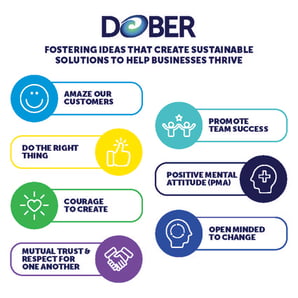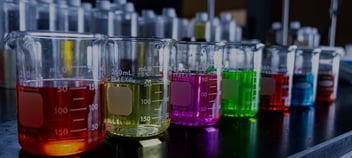What Do Quality Assurance, Quality Control Mean at Dober?
Any company that makes something must have robust quality assurance and quality control processes as part of an overarching quality control management system.
Without these processes, a business opens itself up to significant risk, with potential negative outcomes ranging from faulty products, brand erosion due to said products and even potential legal action from customers if use of a product results in injury.
Simply put, the stakes are high when manufacturing anything, whether it's a toy for children or a product for industrial applications. 
As a manufacturer of specialty chemicals, quality is something Dober takes very seriously. Dober has rigorous processes in place to ensure the highest quality of our products and, in turn, ensure customer satisfaction. Furthermore, as Dober operates in industries with significant competition and high expectations, including pharmaceutical, water treatment and automotive performance fluids, we pride ourselves on consistently excellent quality as a differentiating factor.
It's not just a talking point: "amaze our customers" is a Dober core value.
Furthermore, in the long term, developing a reputation of quality can be a significant boost to any company's brand (assuming those quality processes are maintained over time and do not experience slippage as a result of personnel turnover, cost-cutting initiatives, etc.).
In that vein, Dober has earned a reputation of quality through strong practices and high customer satisfaction. A few Dober numbers:
-
Dober manages over 200 chemical suppliers
-
Process over 1,000 raw material shipments per year
-
Over 1,600 finished good samples last year
In this article, we will summarize:
- The differences between quality assurance (QA) and quality control (QC)
- Why strong QA and QC processes are important
- How Dober's QA and QC processes work to promote quality
- What quality means to the Dober QA/QC team
differences between quality control and quality assurance
Quality control (QC) and quality assurance (QA) are two important concepts in manufacturing, but they have different meanings and goals. Here's a brief summary of the differences:
Quality control (QC):
- Focuses on the product itself and aims to detect and correct defects and errors.
- Is a reactive process that occurs during or after production, typically through inspections or testing.
- Uses statistical tools and methods to measure and analyze data.
- Is primarily concerned with maintaining consistency and meeting product specifications.
Quality assurance (QA):
- Focuses on the process of making the product and aims to prevent defects and errors from occurring in the first place.
- Is a proactive process that occurs before and during production, typically through process improvements and training.
- Uses quality planning, quality control, and quality improvement to achieve quality objectives.
- Is primarily concerned with continuously improving processes and ensuring customer satisfaction.
Why are quality assurance, quality control important?
We've identified some of the primary differences between quality control and quality assurance, namely that quality assurance is a proactive step at the formulation stage, while quality control is a reactive step at the production stage.
So why exactly are these processes important? More specifically, what does having strong quality processes do for your business?
Quality Assurance Saves Time, Money
Quality assurance can be seen as the first line of defense from potential quality issues. As mentioned above, quality assurance is a proactive step, meaning any product defects are, in theory, detected in the formulation/design stage (rather than reactively after a product has been produced).
Think about the automotive industry, for example. You have most likely read news reports about product recalls (or have had the misfortune of owning a model that has been subject to a product recall). The result is:
- Significant hassle to customers who own those vehicles and have to do the work to get remediation
- Added workload to service centers who have to work with customers to process remediation of issues
- Stress on manufacturing/production teams to reactively fix the issue(s)
Bottom line, all of that costs time and money, both to the consumer and the company producing the vehicle. How much time and money can a quality assurance mistake cost a business?
The American Society for Quality defines cost of quality as a "methodology that allows an organization to determine the extent to which its resources are used for activities that prevent poor quality, that appraise the quality of the organization’s products or services, and that result from internal and external failures."
So what are the true costs of quality? The American Society for Quality notes that as a percentage of sales revenue, they can be quite high.
"Many organizations will have true quality-related costs as high as 15-20% of sales revenue, some going as high as 40% of total operations," the ASC notes. "A general rule of thumb is that costs of poor quality in a thriving company will be about 10-15% of operations. Effective quality improvement programs can reduce this substantially, thus making a direct contribution to profits."
Costs of poor quality fall under three categories: appraisal costs (i.e., costs associated with internal quality checks), internal failure costs and external failure costs.
Quality Control Matters
Meanwhile, quality control focuses on the inspection of the actual product once it is in production or has been produced. Like quality assurance, quality control also has a significant cost in terms of time and money.
If your company has poor quality control processes, you could waste time and resources to produce products that aren't up to your or your customers' standards.
While some stakeholders in a company might focus on the costs associated with implementing strong quality management systems — which might include more dedicated personnel, monitoring software, etc. — there are in fact costs associated with poor quality. In other words, companies really can't afford to skimp on quality management, at least not in the longer term.
How Does Dober manage quality?
Dober manufactures products across several critical industry sectors, including cleaning detergents used in the pharmaceutical industry, water treatment chemicals, cooling tower chemicals and automotive performance fluids. .png?width=640&height=320&name=Dober-Quality-Management%20(640%20%C3%97%20320%20px).png)
What that means is Dober works hard to manufacturer products that are high quality, up to code and adhere to relevant regulations. The end goal is overall safety of the product and customer satisfaction.
In addition, there are internal benefits. Instead of time spent dealing with quality issues necessitating recalls, reformulations and material waste, strong quality processes promote greater efficiencies and more throughput, which ultimately bolsters the bottom line.
Certifications and Memberships
Dober is ISO 9001:2015 certified, the international standard that specifies requirements for a quality management system (QMS).
Furthermore, Dober is ISO 14001:2015 certified, the standard specifying requirements for an environmental management system.
In addition, Dober is a member of the Alliance for Chemical Distribution (ACD, formerly the National Association of Chemical Distributors), is ACD certified and a recipient of the 2019 Responsible Distribution Excellence Award from the organization.
Robust QC Lab Footprint
Dober has quality control labs at its Woodridge and Glenwood locations in Illinois, as well as in Hazleton, Pennsylvania.
Meanwhile, Dober's quality assurance operation is based out of Woodridge.
Consistent Communication
The Dober quality team is constantly in communication across its multiple sites and able to jump on issues as they come up and on a preemptive basis through internal review of processes. Furthermore, Dober's quality team engages in significant cross-functional communication with other teams, including research and development (e.g., testing water to be used for automotive coolants).
Ongoing Training
The Dober quality team undergoes regular training consistent with the aforementioned ISO certification (plus new trainings required by future iterations of the ISO standard), in addition to third-party training.
Taking it a step further, the Dober team also goes through internal refresher trainings, plus onboarding training for new hires.
Consistent Monitoring
The quality team at Dober tracks batch failures and leading investigations. When any type of failure occurs, the quality team investigates, corrects and improves processes as necessary.
Auditing
Dober conducts both onsite and paper audits, with 1-2 onsite audits from customers per year. Paper audits have become more common in the in the COVID era; Dober processes 1-2 paper audits monthly, which are rigorous and can be over 30 pages in length.
Audits are rigorous and often centered on GMP or IATF 16949 (for automotive). Furthermore, Dober is often on a 3-5 year re-audit cycle, meaning we always have to stay on top of our game when it comes to quality process and quality results.
Internal audits are conducted quarterly.
In addition, Dober conducts qualification of chemical suppliers and toll blenders.
Next-Level Quality
In many cases, particularly in the pharmaceutical world, Dober's quality processes exceed those outlined by the aforementioned ISO standard. Because those companies are regulated by the Food and Drug Administration, they typically seek better traceability, better cleaning and more documentation. Dober always works to ensure quality specifications not just meet standards like ISO, but exceed them and conform to customers' expectations.
Outbound Checks
All shipments are logged digitally with a photo prior to going out to the customer.
What Quality Really Means at Dober
Dober Quality Manager Rola Saleh explains that the end goals of quality are customer satisfaction and continual improvement of quality management processes.
"We take our customers' feedback very seriously," she said. "We'll go above and beyond to improve anything that they say is deficient in any way. The same goes for any audits."
However, improving the quality management system and its processes at Dober is not just a reactive venture: it's also powered by internally driven and consistent improvements.
"We're always improving," she added. "The team is able to say 'hey, this process is not great, can we do XYZ?' It's that constant feedback and constant improvement that I think is really impressive here."
With all that, Dober's robust quality management team is one powerful piece in the company's story — interested in learning more about our capabilities, products and history? Reach out to us and we'd be happy to answer any questions.


.png?width=352&name=8%20Coolant%20Additive%20Blending%20locations%20(1).png)

